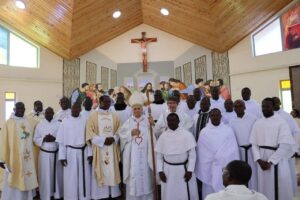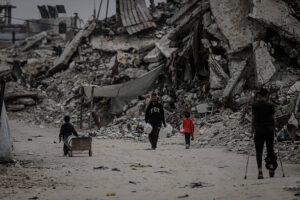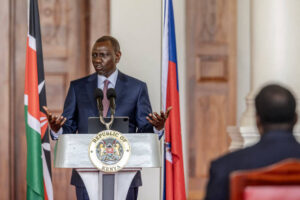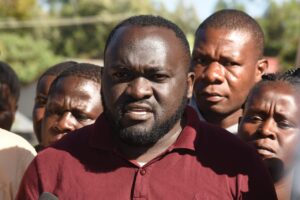
By Derrick Wanjala
At least 45 civilians have been killed in a spate of attacks over the past week across the Democratic Republic of Congo’s troubled North Kivu province. Decades of fighting between armed groups over lucrative gold and mineral deposits has devastated the region, forcing millions from their homes.

A TROUBLED HISTORY.
The Democratic Republic of Congo (DRC) has long been a battleground for various armed groups vying for control over its rich natural resources. North Kivu province, in particular, has borne the brunt of this violence. This latest series of attacks has once again brought the region’s ongoing conflict into sharp focus.
THE RECENT ATTACKS.
According to local sources, the Islamic State-linked Allied Democratic Forces (ADF) are suspected of carrying out the recent wave of violence. The attackers targeted several villages in the region surrounding the city of Beni, causing widespread panic and displacement. Mamove district was reported to be the worst hit, with numerous homes torched and motorbikes stolen.
HUMANITARIAN CRISIS
The violence has led to a humanitarian crisis as thousands flee their homes in search of safety. Leon Siviwe, an administrative leader in Beni, expressed concern that the death toll could rise as the search for victims continues. “The population is fleeing and heading towards supposedly secure areas,” he told the AFP news agency.

THE ADF AND ITS ORIGINS
The ADF was originally formed in the 1990s in eastern Uganda. It began as a rebel group opposing President Yoweri Museveni’s government, which they accused of persecuting Muslims. Over time, the ADF moved its operations to the DRC, where it has continued its violent campaign.
LINKS TO ISLAMIC STATE
Analysts believe the ADF’s alliance with Islamic State (IS) began about six years ago, though the connections are considered tenuous. An online post by IS claimed responsibility for one of this week’s attacks, stating that Christians were targeted. This has raised further fears of sectarian violence in the region.
MILITARY OPERATIONS
In response to the ongoing threat, Ugandan and Congolese forces launched joint military operations against the ADF in 2021. Despite these efforts, the group has continued to carry out attacks on civilians. The persistence of these attacks underscores the challenges faced by both governments in bringing lasting peace to the area.
THE M23 REBELLION
Adding to the complexity of the situation is the resurgence of the M23 rebel group. This group has also been active in eastern DRC, seizing territory from government forces. There are widespread allegations that Rwanda is backing the M23, although Kigali has consistently denied any involvement.
THE HUMAN COST
The human cost of the conflict is immense. Families are torn apart, communities are destroyed, and the constant threat of violence hangs over the region. The recent attacks have only exacerbated these issues, leaving many in North Kivu province in a state of perpetual fear.
CALLS FOR INTERNATIONAL SUPPORT.
There have been increasing calls for international support to help stabilize the region. Humanitarian organizations are struggling to provide aid to those affected by the violence, and there is a pressing need for more resources and attention from the global community.
THE PATH FORWARD.
Finding a path forward in North Kivu will require a multifaceted approach. Strengthening the capacity of local and national security forces, addressing the underlying economic drivers of conflict, and fostering dialogue between communities are all essential steps.
LOCAL PERSPECTIVES.
Local leaders and community members have expressed a mix of fear and resilience. Many are determined to rebuild their lives despite the ongoing threats. “We cannot give up,” said one resident of Beni. “Our future depends on our ability to come together and find peace.”
ECONOMIC IMPACT.
The economic impact of the conflict cannot be overstated. The region’s rich mineral resources, which should be a source of prosperity, have instead become a curse. Armed groups continue to exploit these resources, fueling the cycle of violence and instability.
THE ROLE OF THE GOVERNMENT.
The Congolese government faces significant challenges in addressing the conflict. Corruption, lack of resources, and political instability all hinder its ability to effectively combat rebel groups. Nevertheless, there are ongoing efforts to strengthen governance and improve security in the region.
REGIONAL DYNAMICS
The conflict in North Kivu is part of a broader pattern of instability in the Great Lakes region of Africa. Neighboring countries, including Uganda and Rwanda, have been drawn into the conflict, further complicating efforts to achieve peace.
HUMAN RIGHTS CONCERNS
Human rights organizations have documented numerous abuses by both rebel groups and government forces. Ensuring accountability and justice for these violations is critical to building a sustainable peace.
THE ROLE OF WOMEN AND CHILDREN
Women and children are disproportionately affected by the conflict. Many have been subjected to sexual violence, forced displacement, and loss of livelihoods. Addressing their needs and ensuring their protection must be a priority in any peacebuilding efforts.
EDUCATION AND YOUTH
The conflict has also had a devastating impact on education. Schools have been destroyed, and many children have been unable to attend classes due to the violence. Investing in education and providing opportunities for young people is essential for the long-term stability of the region.
INTERNATIONAL RESPONSE
The international community has a critical role to play in supporting peace efforts in North Kivu. Increased diplomatic engagement, financial support for humanitarian aid, and pressure on regional actors to end their involvement in the conflict are all necessary steps.
HOPE FOR THE FUTURE
Despite the challenges, there is hope for the future. Many in North Kivu remain committed to achieving peace and rebuilding their communities. With the right support and a comprehensive approach to addressing the root causes of the conflict, there is a possibility for lasting stability.
CONCLUSION
The situation in North Kivu is complex and multifaceted, involving a range of local, national, and international actors. Addressing the ongoing violence and humanitarian crisis will require a concerted effort from all stakeholders. By understanding the underlying dynamics and working together towards a common goal, there is a chance to bring peace to this troubled region.





